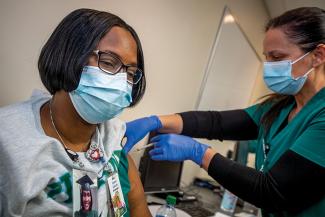Such breadth of knowledge and perspectives helps drive collaboration, innovation and the pursuit of excellence as we work to create a better tomorrow.
And a better tomorrow is something all of us have been hoping for, especially over the last two years. COVID-19 presented an existential challenge to universities while also highlighting our raison d’être. It made university-based research and health care more relevant than ever while simultaneously leading some to question the wisdom of the residential university model.
College students were sometimes cast as particularly virulent vectors of this disease and many commentators opined that universities should halt in-person instruction.
At Tulane, we knew our research, healthcare and educational mission had an important role to play in confronting this global threat. We had to stay open but do so with the health of our students, faculty, staff and neighbors as our top priority. The resulting testing, contact tracing and quarantine/isolation program we implemented, along with strict safety protocols, made Tulane one of the nation’s leaders in adapting to the challenges of COVID-19.































































